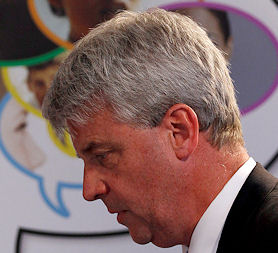Andrew Lansley publishes Public Health White Paper
Health Secretary Andrew Lansley outlines the Government’s public health plans for England – saying he wants to “nudge” rather than push people in the right direction.
Mr Lansley told the Commons that the Labour administration’s “nannying” had now come to an end.
“It’s time for politicians to stop telling people to make healthy choices; time to start actually helping them to do it.
“There will be a profound shift in tone , attitude and outlook. Rather than nannying people, we will nudge them by working with industry to make healthier lifestyles easier.”
“Rather than nannying people, we will nudge them.” Health Secretary Andrew Lansley
Despite the light touch approach, Downing Street announced the Government would take steps to combat problem drinking by levying higher taxes on super-strength beer and lager.
But the Royal College of Physicians said the plans were little more than “window-dressing”, while the British Medical Association condemned the Government for not doing more to combat smoking.
Alcohol taxes
Downing Street announced today that taxes on high-strength beer and lager will be increased to encourage responsible drinking.
The new system of taxation will come into effect from autumn 2011 and will be imposed on beer with a strength above 7.5 per cent. Duties on beer with a strength of 2.8 per cent or lower will be cut.
Chancellor George Osborne will announce the new rates in his Budget next spring.
The Prime Minister's spokesman said: "The objective is to encourage the production and consumption of lower-strength, rather than higher strength beers," said the spokesman.
"Clearly, tax is one of the instruments by which we can create incentives for production and consumption to change."
Brigid Simmonds, chief executive of the British Beer and Pub Association, said the reduction in duty on beer below 2.8 per cent would "provide a welcome incentive for further investment in these beers and encourage people to choose lower-strength drinks".
She added: "However, when it comes to the increase in duty on higher-strength beers, these account for less than half of 1 per cent of total alcohol sales, and less than 1 per cent of beer sales."
The Treasury said in a report that strong beers and lagers were "consumed disproportionately by men, and by those in lower socio-economic groups".
The report added: "A submission from a homelessness charity stated that a number of the homeless men and women that they work with are specifically addicted to super-strength lagers, which cause significant health issues."

The Government’s Public Health White Paper, published today, says a new body will be created to take a lead.
Public Health England will be responsible for vaccination programmes, flu pandemics, cancer screening and adult health checks.
Local authorities
Local authorities will also play a big role in public health and will receive a ringfenced budget of £4bn a year.
Public health directors, who currently work for the NHS, will transfer to councils; while a Health Inclusion Board will look at deprivation and health inequalities.
Councils that succeed in tackling inequalities will be rewarded with a new public health “premium” payment.
Obesity
Mr Lansley was criticised in the summer when he said that companies such as Mars, Cadbury and Coca-Cola should have a role in funding anti-obesity campaigns.
He said today that industry and charities would focus on five areas – food, alcohol, exercise, health at work and changing people’s behaviour.
The initiative will be launched next year and will strike new agreements on salt in food and providing consumers with nutritional information.
Smoking
On smoking, the White Paper says the Government will consider proposals for cigarettes to be sold in plain packaging and for shops to be banned from displaying them.
Dr Vivienne Nathanson, from the British Medical Association, urged Mr Lansley to implement the provision in the 2009 Health Act that would end tobacco displays in large supermarkets from September 2011.
She added: “We do not understand why he is not taking this decisive action to put cigarettes out of sight in shops.”